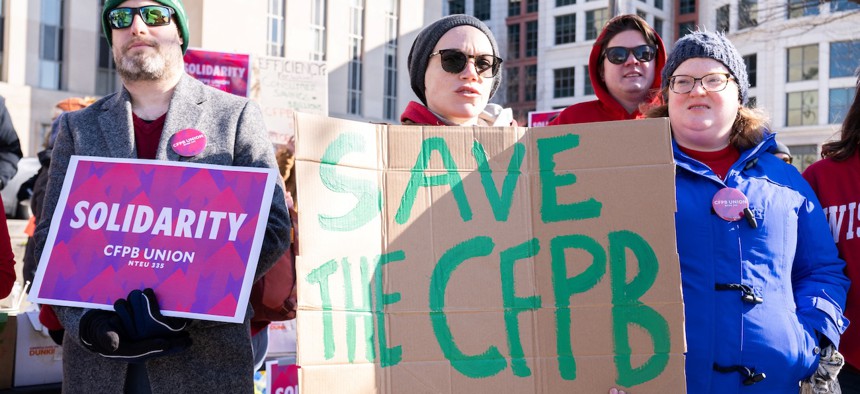
Demonstrators protest against cuts to the Consumer Financial Protection Bureau (CFPB) by President Trump and Elon Musks' DOGE initiative, as a hearing is scheduled to take place at the E. Barrett Prettyman United States Federal Court House in Washington, D.C., on March 3, 2025. Since taking office in January, Trump has launched a campaign to shrink the federal government. SAUL LOEB/AFP via Getty Images
NTEU Chief: The people—and the law—will insist that CFPB survive
COMMENTARY | "If a president objects to a federal law, they need to take it up with Congress, not fire everyone hired to implement it," writes Doreen Greenwald, national president of the National Treasury Employees Union.
It’s somewhat fortuitous that the administration’s lawless wrecking crew chose such a young, beloved, and statutorily sound agency to dismantle.
By targeting the Consumer Financial Protection Bureau (CFPB), the executive branch exposed its flagrant disregard for the people’s representatives in Congress, the laws they pass to protect their voters from financial harm, and the public servants who have dedicated their careers to its virtuous mission.
It is this lack of respect for the separation of powers that is the heart of our lawsuit to save the CFPB from the White House’s slash-and-burn approach to government.
But it’s not enough to call this a separation of powers case. That phrase, while crucial in the courtroom, glosses over its more practical application outside of the courthouse: The branch of government closest to the people—whose members are most accountable to the voters—is being absolutely railroaded by the executive branch.
More bluntly, by abolishing the CFPB, the president of the United States is doing the exact opposite of what the people want. It’s not just an affront to the Constitution; it’s a stone-cold rejection of the people’s wishes.
CFPB’s origin story explains it well. The financial crisis and catastrophic recession of 2008 was caused in part by homebuyers being hoodwinked into complicated mortgages they couldn’t afford. Banks failed, jobs were lost, property values plummeted, and retirement savings vanished, prompting the people, through Congress, to build new safeguards. The Dodd-Frank Wall Street Reform and Consumer Protection Act of 2010 created the CFPB and gave it some very specific instructions for enforcing federal consumer financial laws, supervising the financial services industry, and educating consumers on making informed financial decisions.
Having failed to break CFPB in the legislative and judicial branches, it’s no surprise the special interests opposing the idea of a strong consumer watchdog investigating consumer complaints and imposing fines on bad actors would turn to the executive branch as a last resort.
That’s not how any of this is supposed to work.
If a president objects to a federal law, they need to take it up with Congress, not fire everyone hired to implement it. This logic applies to nearly everything the so-called Department of Government Efficiency (DOGE) is destroying: If the president thinks the Clean Air Act is too much of a burden on companies that burn fossil fuels, they, along with their allies should petition Congress for a new law, not fire the experts at the Environmental Protection Agency. If they think the ultra-wealthy pay too many taxes, ask Congress to rewrite the tax code, don’t fire the professionals at the Internal Revenue Service specializing in audits of high net-worth individuals.
The work of civil servants is apolitical; it is never their job to engage in partisanship. Terminating the work of an entire agency does nothing to change the law in and of itself. It ends jobs and robs taxpayers of critical services they deserve—services Congress deemed in the public interest. Shuttering agencies doesn’t consider the impact on those who must live with the consequences: civil servants, their families, and communities across the country. And what do we get in return? The law remains the same, no one is there to enforce it, jobs are lost, and taxpayers suffer. It’s the very definition of dysfunction.
Ironically, CFPB’s undeniable record of success in accomplishing its congressionally mandated mission is exactly why DOGE is so determined to destroy it. The public servants who raised their hands and agreed to build CFPB from the ground up understood the assignment: Hold corporate America accountable when it takes advantage of unsuspecting customers. The result? More than $20 billion in compensation to victims, including reductions in principal amounts owed, canceled debts, and other consumer relief.
CFPB employees represent public service at its finest. Employees forego better paying jobs in the private sector because they feel strongly about using their skills to help seniors, veterans, college students, and anyone who has ever been unfairly lured into debt with false promises about how much it will cost to pay it off.
The people spoke, Congress answered and the CFPB, in a few short years, has built an enduring legacy of justice, fairness, and accountability. DOGE’s brazen attempt to do an end-run on the most fundamental of constitutional principles must be stopped.
Doreen Greenwald is the national president of the National Treasury Employees Union, which represents frontline employees at CFPB and 36 other federal agencies and offices.






